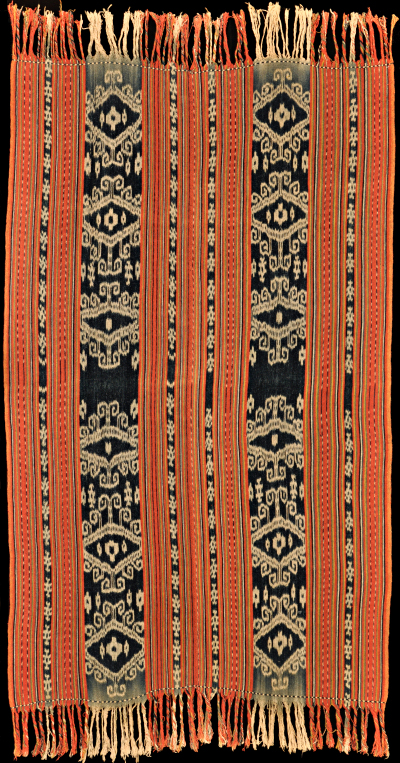| |
 
 | | | |
002 Timor, East Timor
Beti naek (men's wrap)  
| | Locale: | Oecusse/Ambenu, the East-Timorese exclave in West-Timor. Capital Pante Macassar or village in the lower elevations. Atoni people. | | Period: | Late 19th to early 20th c. | | Yarn: | Fine, double ply; twin warp, single weft. Whether hand-spun or commercial could not be ascertained.� | | Technique: | Warp ikat | | Panels: | 2 | | Size: | 97 x 165 cm (3' 2" x 5' 4") LW: 1.70 | | Weight: | 855 g (30.2 oz), 534 g/m2 (1.75 oz/ft2) | | Design: | Beti naek (beti meaning men's blanket in Dawan, naek meaning great). Bands of indigo and white ikat, alternated with bands of coloured stripes (red, yellow, green, black). The main motif, called kaif, represents ancestral relationships. The cloth is subtly asymmetric: there is a very fine ikated line to the right of the seam that has no counterpart on the left panel. Also, on the left panel, just below and above the horizontal axis, there are four small v-shapes that have no counterpart on the right panel. The number of lozenges in these narrow bands also differs: twenty-four per band in the left panel, twenty-two on the right. | | Comment: | The cloth has the faint skatol smell (elegantly put the 'stable' smell') of ageing indigo. Cloths from Ambenu, especially early and vintage ones, are rare because of the area's isolation. | | Background: | Chapters on Timor and East Timor. | | Exhibited: | Museu do Oriente, Lisbon, 2014/15.
Hong Kong University Museum and Art Gallery, 2017..
Timor: Totems and Tokens, Museu do Oriente, Lisbon, 2019/20. | | Published: | Woven Languages, 2014.
Ikat Textiles of the Indonesian Archipelago, 2018.
Timor: Totems and Tokens, 2019.
Ikat from Timor and its Outer Islands, 2022.
| | Compare: | 256 169 118 189 | | Sources: | Nearly identical to beti naik from Taiboko village in Yeager and Jacobson, Textiles of Western Timor, Fig. 194, very to rather similar to Plates 192, 193. See also Chapter 8.4.2.2. Very similar to Ambenu beti in Fundação Oriente, Povos de Timor, Povo de Timor, p. 23 Fig, 2. Also very similar to our PC 169, 118 and 169, except that the latter two are both symmetrical. A very interesting cognate was discovered during a visit with curator Dr. Paulo Costa to the Indonesia section of the rich Francisco Capelo collection, held in Lisbon's new Casa Asia. Not just the motifs are similar, but also the minimal approach to creating asymmetry with tiny devices. In addition it has a much more marked form of asymmetry, that is still easy to overlook. Where in the specimen shown here there two narrow ikated bands running along the seam, in the Capelo specimen there is only one - and it runs entirely on the right panel. | | |

©Peter ten Hoopen, 2025
All rights reserved.
|
|


